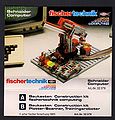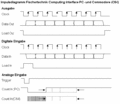The Fischertechnik Interface is used for :
Inputs/Outputs
The interface for the CPC (as well as newer RS232/USB versions) consists of:
- 8 single bit inputs ports (eg. for sensing when a robot-arm reached its end-position)
- 4 "bidirectional" ports (for motor control) (here "bidirectional" rather means "three-state-output" aka "forward/stop/backward")
- 2 analog inputs (eg. for temperature sensor)
Covertape
Tape
Download
- Fischertechnik Computing - Baukasten Construction Kit (tape).zip (CDT for Emulators)
Interface Versions
Fischertechnik has built several interfaces:
- Interface for Parallel Ports (used on C64/VIC20/CPC/PC/Atari/Amiga)
- Interface for RS232 Ports (used on PCs) (9600 baud, 8bit, no parity, 1 stopbit)
- Interface for USB Ports (used on PCs)
Parallel Printer Port Interface
Designed for one-directional Printer Ports: Data is read/sent via Pin11/Pin4 (which data is to be transferred is selected via the other DATA lines) (details on how the data is transferred exactly are unknown?).
Printer Pin Interface Signal Comment Pin2 (Data Bit0) Load-out ;motor control output Pin3 (Data Bit1) Load-in ;digital sensor 8bit input Pin4 (Data Bit2) Data-out ;data from computer Pin5 (Data Bit3) Clock ;data clock Pin6 (Data Bit4) Trigger-x ;analog sensor X input Pin7 (Data Bit5) Trigger-y ;analog sensor Y input Pin11 (Busy) Data/Count-in ;data to computer (some variants seem to have separate pins: Busy=Data-in and Ack=Count-in) Pin.. (GND) Ground ;ground
The parallel fischertechnik interface has a 20pin (or 10pin) cable (the 10pin cable was used in early commodore versions, the 20pin variant was invented to simplify printer-port connections, which have GND on each 2nd wire). The various supported computers have different pin-outs: 24pin Edge (C64/VIC20), 25pin DSUB (PC/Amiga/Atari), 34pin Edge (CPC464/CPC664), or 36pin Centronics (german CPC6128). To solve that, some cables have a N-pin connector on a 20-pin cable. Others have a 20-pin connector, with additional 20-pin to N-pin adaptor.
Pictures
Weblinks
- https://web.archive.org/web/20170625102106/http://www.sascha-bader.de/html/ftpc2c64.html - Fischertechnik DIY Adapters






